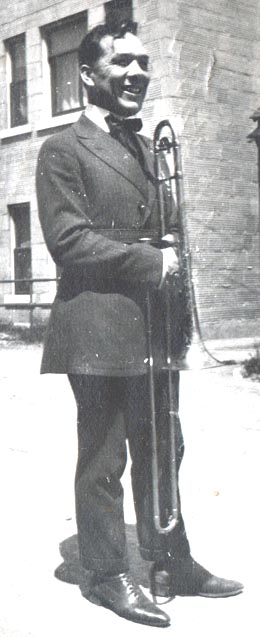On Thursday evening, February 22, 1894, the Puyallup Reservation Band performs at a banquet/dance and then later for the editors and staff of the Tacoma Daily Ledger at their offices. The band consists of a dozen Indian youths -- including future music star William "Chief" Arquette (1884-1943) -- from the Cushman Indian School on the reservation and their instructor and bandleader Henry J. Phillips.
Do the Puyallup
The Puyallup Reservation Band was a point of pride for members of the local S'Puyalupubsh (Puyallup) Tribe, and in addition seems to have been a bit of a cultural curiosity around nearby Tacoma -- as well as a target of paternalistic pride for civic leaders in the area. The ensemble traced its origins back at least as far as the 1880s, and was eventually called upon to perform at numerous parades, concerts, and other events celebrating mayors, governors, and even a visiting U.S. Vice President.
The band was initially organized and directed by a Professor Davis, from the U.S. government-administered school on the Puyallup Reservation. But the group's personnel was evidently not strictly limited to youthful students. After the school hired Edwin L. Chalcraft (1855-1943) as a new superintendent in July 1889, he noted that the band "had been only moderately successful because of many changes in personnel, and the last time it had appeared in public was at our Christmas Eve exercises December 24th, 1889" (Chalcraft, 103).
Upon the demise of the initial band, however, a Mr. Peter Stanup arranged for the instruments to be donated to the school, and then on February 1, 1890, Henry J. Phillips was hired there as a teacher. Chalcraft wrote:
"He was a likable sort of chap and soon became one of our most important employees ... He was an excellent musician and possessed an unusual ability as an instructor ... Mr. Phillips undertook the task of developing a school band, composed of pupils only. He selected the required number of boys, none having any knowledge, whatsoever, of music, and went to work. Naturally progress was slow at first, but within a reasonable time, he had a band capable of playing in public, not only at the school but including various places in the city of Tacoma" (Chalcraft, 103-104).
Boys in the Band
In 1879 the U.S. Congress designated February 22 as a federal holiday to honor the birthday of the nation's first president, George Washington (1732-1799), and Washington's Birthday became a particularly patriotic day for all sorts of celebrations. (Observed since 1968 on the third Monday of February, the holiday is now widely known as Presidents' Day.)
On the Washington's Birthday evening of February 22, 1894, the young bandmembers performed at a banquet and dance thrown by C Company and the Washington Guards to celebrate the grand opening of Tacoma's new Troop B headquarters at the Riding Club's hall on G Street. Then the band went over to the newspaper offices of the Tacoma Daily Ledger at 928 Broadway. There "a number of selections were rendered in a most praise-worthy manner" -- albeit admirable only if "the music played and the ages of the players are considered" ("Serenaded by ...").
The Daily Ledger reported that, "At the conclusion of the impromptu concert the players watched with deep interest the working of the Ledger's type-setting machines" ("Serenaded by ..."). The newspaper also noted the names and young ages of the band's members -- which included three Arquette brothers (and, notably, a lad with the surname "Seattle"):
- James Arquette (age 12)
- John Arquette (age 16)
- Willie Arquette (age 8)
- Harry Bobb (age 10)
- Joseph Craig (age 14)
- Charles Dan (age 17)
- Joseph Dan (age 13)
- Walter Harris (age 14)
- George Northrop (age 13)
- Dan Ross (age 12)
- James Ross (age 12)
- Matthew Seattle (age 17)
"Chief" Arquette
Of the players in the Puyallup band, it would be the multi-instrumentalist (trombone, sousaphone, trumpet, and cornet) William "Willie" Arquette who would go on to enjoy a successful, and rather high-profile, career in music. After studying in Pennsylvania at the Carlisle Indian Industrial School, he continued his studies at Yale University's Haskell School of Music and then the Philadelphia School of Music.
Going pro, Arquette joined the United States Indian Band, which performed at the Louisiana Purchase Exposition (St. Louis World's Fair) in 1904. From there he was recruited into America's most revered band, by John Phillip Sousa (1854-1932) -- and was likely given the stage-name "Chief" during this career phase. He then toured with William Frederick "Buffalo Bill" Cody's (1846-1917) Wild West Show troupe. In 1917 Arquette joined Seattle's American Federation of Musicians (AFM) Local 76, and then performed with the Pantages Theatre Orchestra, recorded for Victor Records, played on the radio, gigged with several major Seattle-area dance bands up through the 1930s, and by the 1940s was serving as third-chair trombonist with the Seattle Symphony Orchestra.

